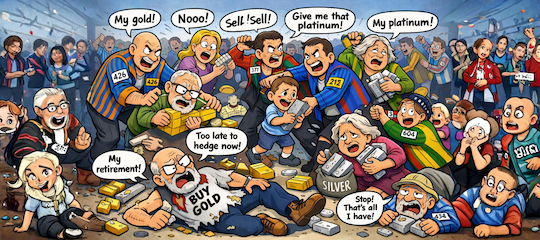Posted June 10, 2024
By Sean Ring
Right Turn, Claude!
John Ring, philosopher-truck driver emeritus, loves old Clint Eastwood movies. Dirty Harry, Magnum Force, you name it. He likes it.
But what makes him laugh his ass off every time is Every Which Way But Loose and Any Which Way You Can, two of Clint’s movies from what I call his “Burt Reynolds period.”
Clint played Philo Beddoe, a bare-knuckle boxer with an orangutan named Clyde for a pet – or buddy. Whenever he needs Clyde to hit someone for him, he says, “Right Turn, Clyde!” and Clyde knocks the enemy out.
As I alluded to in yesterday’s Rude, Claude Q. Eurotrash has had enough of Europe’s piss-poor status quo.
Claude went to the polls Sunday night and gave Manny Macron and Olaf Scholz an ass-kicking they will never forget.
The results show a monumental shift in Europe's political landscape. Far-right parties – or the “Right So Far” parties – gained bigly across several key member states.
This shift reflects a broader trend of rising nationalism and conservatism across the continent, challenging the traditional leftist political order and hopefully signaling a new era in European politics.
In a remarkable show, far-right parties swept the elections, unseating many incumbents and altering the political dynamics in Europe. This shift was most pronounced in France and Germany, where Marine Le Pen's National Rally and the Alternative for Germany (AfD) saw unprecedented support.
Let’s get to the nitty gritty.
France
Marine Le Pen's National Rally achieved a historic victory, capturing 31.5% of the vote. This result has humbled President Emmanuel Macron's party and led to the dissolution of the French parliament and the scheduling of fresh national elections for June 30. Delicious!
This outcome marks the highest support the National Rally has ever received in a national vote.
Macron's dissolution of the parliament demonstrates the severity of the political crisis in France.
With the National Rally's victory, there’s an anticipated shift in domestic policies, mainly focusing on immigration, national identity, and economic reforms aimed at benefiting French citizens primarily. This shift may also impact France's stance in the EU, potentially leading to more stringent negotiations on EU policies and reforms.
Germany
The AfD finished second in Germany, ahead of Chancellor Olaf Scholz’s Social Democratic Party (SPD). This outcome is a major setback for the ruling coalition, prompting significant political introspection within Germany. The AfD's strong performance highlights growing discontent with the current government's policies, particularly concerning immigration and economic issues.
The rise of the AfD in Germany signals a significant shift in the country's political landscape. The AfD's policies, often seen as eurosceptic and nationalist, will likely challenge the current government's approach to EU integration and immigration policies. This change will lead to a more fragmented political environment in Germany, with increased national sovereignty and economic protectionism debates.
Broader European Impact
The results indicate a broader trend towards conservative and far-right ideologies across the continent. The European Conservatives and Reformists (ECR) group and the Identity and Democracy (ID) group have increased their representation, signaling a shift towards more nationalist and eurosceptic policies within the European Parliament.
Italy and Spain
Matteo Salvini's League party and Giorgia Meloni's Brothers of Italy performed strongly in Italy, consolidating their influence within the right-wing coalition. Similarly, Spain saw the rise of Vox, which has doubled its seats, reflecting a growing appetite for hardline policies on immigration and national sovereignty.
The success of these parties in Italy and Spain underscores a growing trend towards right-wing populism.
Remember, when it comes from the left, it’s democracy. When it comes from the right, it’s populism.
These parties advocate stronger borders, reduced immigration, and reevaluating their countries' roles within the EU.
In Italy, Salvini and Meloni's influence is expected to push the government towards more nationalist policies, potentially challenging EU regulations on budgetary constraints and immigration.
In Spain, Vox's rise indicates a significant shift in public sentiment, leading to more assertive national security and cultural identity policies.
Eastern Europe
Countries like Hungary and Poland, which have already leaned towards nationalist policies, have further entrenched their positions. The ruling parties in both countries, Fidesz in Hungary and Law and Justice (PiS) in Poland, secured significant victories, reinforcing their mandates to pursue their respective conservative agendas.
In Hungary, Viktor Orbán's Fidesz party continues to dominate, advocating strong national sovereignty and resistance to the EU's central policies, particularly regarding immigration and judicial reforms.
Poland's PiS also maintains its stronghold, emphasizing traditional values and skepticism towards EU interference in domestic affairs. These outcomes suggest that Eastern Europe will continue challenging EU policies, advocating for greater national autonomy and resistance to liberal EU directives.
Implications for the EU
The results of the 2024 European Parliament elections have several implications for the future of the European Union.
With the increased presence of far-right and conservative MEPs, policies on immigration, border control, and national sovereignty will become more stringent. This shift could lead to more friction within the EU, especially on issues like asylum seekers and integration policies.
The European People's Party (EPP) remains the largest group, but its dominance is now challenged by the growing influence of the far-right and conservatives. Thankfully, Ursula von der Leyen’s bid for a second term as Commission President will face significant hurdles, perhaps eliminating her from contention altogether.
Economic nationalism will gain traction, leading to more protectionist measures. This will impact trade policies, market regulations, and the overall economic integration within the EU. Countries will advocate more localized economic policies prioritizing national interests over EU-wide regulations.
The rise of eurosceptic parties may strain the EU's cohesion, as these parties often support reducing Brussels's power and increasing national sovereignty. This may lead to more disputes over EU legislation and a push for reforms decentralizing EU authority.
The shift towards more nationalist policies in several EU member states will alter the EU's foreign policy approach. There will be a greater emphasis on bilateral relations rather than collective EU stances, weakening the EU's position on the global stage.
Thankfully, far-right and conservative parties have shown little enthusiasm for aggressive climate policies. This will slow down - or halt altogether - the EU's initiatives on climate change, as new MEPs might push for policies prioritizing solid economic growth over unproven environmental sustainability.
Wrap Up
The 2024 European Parliament elections mark a significant turning point in European politics.
The sweeping success of far-right parties reflects a broader shift in public sentiment towards nationalism and conservatism, driven by concerns over immigration, economic stability, and national identity.
As the new Parliament convenes, the EU faces the challenge of navigating this new political landscape, balancing the demands of its diverse member states while striving to maintain unity and forward momentum in its policies and initiatives.
The coming months will be crucial in determining how these new political dynamics will shape the future of the European Union and its role in the world.
The rise of the far-right isn’t a fleeting phenomenon but a reflection of deep-seated changes in public opinion. As traditional parties grapple with these changes, the political landscape of Europe will continue to evolve, bringing both challenges and opportunities for the future of the EU.
This election has undoubtedly set the stage for a new era in European politics, where the voices of nationalism and conservatism will play a more prominent role in shaping the continent's future. Whether this will lead to a more fragmented Europe or a reinvigorated union with a renewed focus on national interests is anyone’s guess.

ANNIHILATION!
Posted February 05, 2026
By Sean Ring

How The Machine Ate Itself
Posted February 04, 2026
By Nick Riso

My Secret to Finding Great Miners… and Avoiding Promoters
Posted February 03, 2026
By Matt Badiali

The Massacre of the Innocents
Posted February 02, 2026
By Sean Ring

METALS MELTDOWN!
Posted January 30, 2026
By Sean Ring

